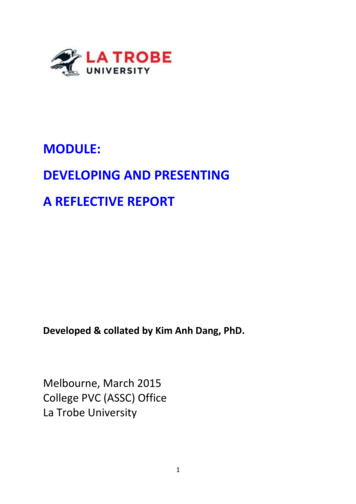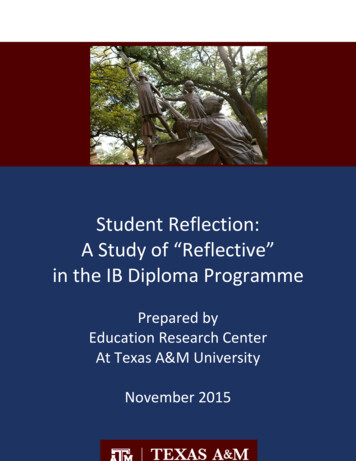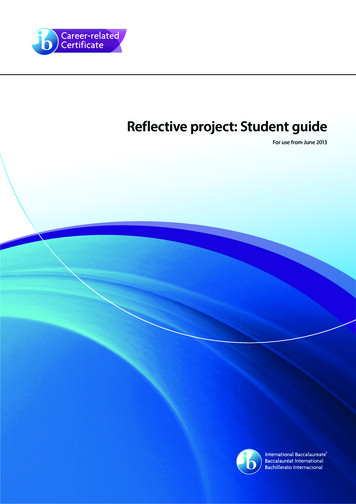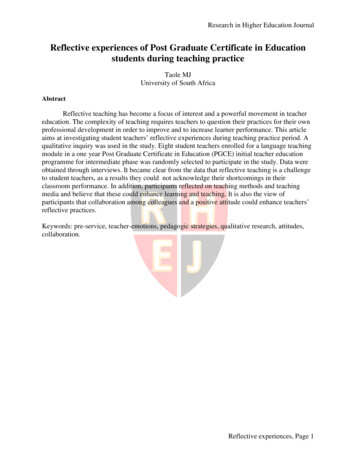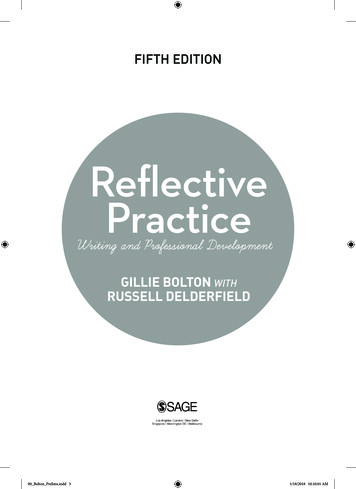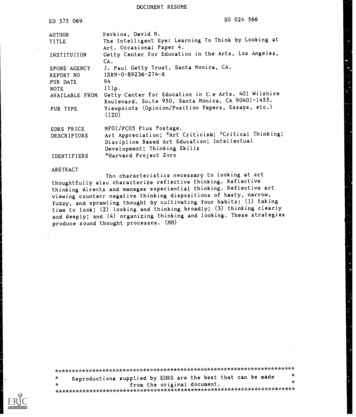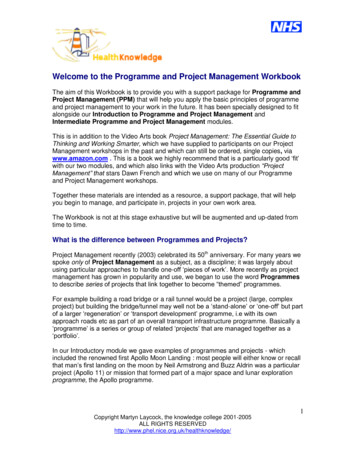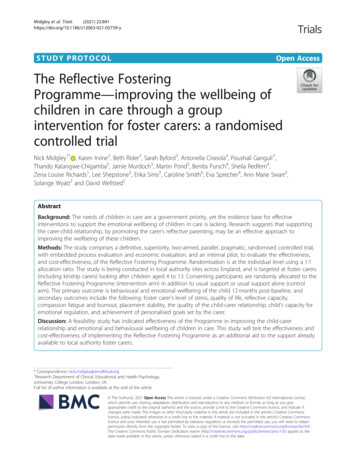
Transcription
Midgley et al. Trials(2021) UDY PROTOCOLOpen AccessThe Reflective FosteringProgramme—improving the wellbeing ofchildren in care through a groupintervention for foster carers: a randomisedcontrolled trialNick Midgley1* , Karen Irvine2, Beth Rider2, Sarah Byford3, Antonella Cirasola4, Poushali Ganguli3,Thando Katangwe-Chigamba5, Jamie Murdoch5, Martin Pond5, Benita Pursch4, Sheila Redfern4,Zena Louise Richards1, Lee Shepstone5, Erika Sims5, Caroline Smith6, Eva Sprecher4, Ann Marie Swart5,Solange Wyatt2 and David Wellsted2AbstractBackground: The needs of children in care are a government priority, yet the evidence base for effectiveinterventions to support the emotional wellbeing of children in care is lacking. Research suggests that supportingthe carer-child relationship, by promoting the carer’s reflective parenting, may be an effective approach toimproving the wellbeing of these children.Methods: The study comprises a definitive, superiority, two-armed, parallel, pragmatic, randomised controlled trial,with embedded process evaluation and economic evaluation, and an internal pilot, to evaluate the effectiveness,and cost-effectiveness, of the Reflective Fostering Programme. Randomisation is at the individual level using a 1:1allocation ratio. The study is being conducted in local authority sites across England, and is targeted at foster carers(including kinship carers) looking after children aged 4 to 13. Consenting participants are randomly allocated to theReflective Fostering Programme (intervention arm) in addition to usual support or usual support alone (controlarm). The primary outcome is behavioural and emotional wellbeing of the child 12 months post-baseline, andsecondary outcomes include the following: foster carer’s level of stress, quality of life, reflective capacity,compassion fatigue and burnout, placement stability, the quality of the child-carer relationship, child’s capacity foremotional regulation, and achievement of personalised goals set by the carer.Discussion: A feasibility study has indicated effectiveness of the Programme in improving the child-carerrelationship and emotional and behavioural wellbeing of children in care. This study will test the effectiveness andcost-effectiveness of implementing the Reflective Fostering Programme as an additional aid to the support alreadyavailable to local authority foster carers.* Correspondence: nick.midgley@annafreud.org1Research Department of Clinical, Educational and Health Psychology,zUniversity College London, London, UKFull list of author information is available at the end of the article The Author(s). 2021 Open Access This article is licensed under a Creative Commons Attribution 4.0 International License,which permits use, sharing, adaptation, distribution and reproduction in any medium or format, as long as you giveappropriate credit to the original author(s) and the source, provide a link to the Creative Commons licence, and indicate ifchanges were made. The images or other third party material in this article are included in the article's Creative Commonslicence, unless indicated otherwise in a credit line to the material. If material is not included in the article's Creative Commonslicence and your intended use is not permitted by statutory regulation or exceeds the permitted use, you will need to obtainpermission directly from the copyright holder. To view a copy of this licence, visit http://creativecommons.org/licenses/by/4.0/.The Creative Commons Public Domain Dedication waiver ) applies to thedata made available in this article, unless otherwise stated in a credit line to the data.
Midgley et al. Trials(2021) 22:841Page 2 of 23Trial registration: ISRCTN 70832140.Keywords: Parenting, Foster care, Children in care, Reflective parenting, Reflective Fostering ProgrammeAdministrative informationThe numbers in curly brackets in this protocol refer toSPIRIT checklist item numbers. The order of the itemshas been modified to group similar items (see -items-forclinical-trials/).Administrative information (Continued)Title {1}The Reflective Fostering Programme– improving the wellbeing ofchildren in care through a groupintervention for foster carers: arandomised controlled trialTrial registration {2a and 2b}.The Trial has been registered with theInternational Standard RandomisedControlled Trial Number registry, whichincludes the 24 items identified by theWHO as being the minimum datasetrequired for trial registration: ISRCTN70832140Protocol version {3}10th November 2020. Version 3.0IntroductionFunding {4}National Institute for Health Research Public Health ResearchBackground and rationale {6a}-Author details {5a} Nick Midgley – University CollegeLondon, London Karen Irvine – University ofHertfordshire, Hatfield Beth Rider - University ofHertfordshire, Hatfield Sheila Redfern – Anna Freud NationalCentre for Children and Families,London Sarah Byford – Kings College London,London Poushali Ganguli - Kings CollegeLondon. London Thando Katangwe-Chigamba, University of East Anglia, Norwich Jamie Murdoch – Kings CollegeLondon, London Martin Pond - University of EastAnglia, Norwich Benita Putsch – Anna Freud NationalCentre for Children and Families,London Zena Louise Richards - UniversityCollege London, London Lee Shepstone - University of EastAnglia, Norwich Erika Sims – University of East Anglia,Norwich Caroline Smith – Kent County Council,Maidstone Ann Marie Swart – University of EastAnglia, Norwich David Wellsted - University ofHertfordshire, Hatfield Solange Wyatt - University ofHertfordshire, HatfieldTitle {1}The Reflective Fostering Programme– improving the wellbeing ofchildren in care through a groupintervention for foster carers: arandomised controlled trialName and contactinformation for the trialsponsor {5b}John Senior, University of Hertfordshire.J.m.senior@herts.ac.uk.Role of sponsor {5c}University of Hertfordshire is theSponsor for this study. The ChiefInvestigator (CI) and Trial Manager (TM)will oversee governance and overallrunning of the study on behalf of theSponsor. The Trial Steering Committee(TSC) provide overall supervision for thestudy on behalf of the study Sponsorand Funder.The Funder is the National Institute forHealth Research.The needs of children in care are a government priority[1] as they are ‘one of the most vulnerable anddisadvantaged groups in our society’ [2]. Poor outcomesfor children in care not only carry huge personal cost forindividuals, but also increase health inequalities acrosssociety, and can place a financial burden on the state [3].In 2019, the number of children in care in Englandincreased by 4% to 78,150. Of these children, 72% werein foster placements [4]. Over 60% had experiencedabuse or neglect prior to placement, and frequentlydemonstrated troubled behaviour [5]. Foster carers oftenstruggle to respond to the complex needs of thesechildren, leading to high levels of stress, which can affectthe quality of caregiving and which may lead some toleave fostering because of burnout [6]. In turn,compromised care heightens the risk of negativeoutcomes for children in care, leading to increasedplacement instability [7] and poor health, educational,and social outcomes [8].Formal support for foster carers in England and Walescomes primarily from the individual social worker, andthis support is highly variable across different regions ofthe UK [9, 10]. Most parenting classes available to fostercarers focus on practical behaviour management skillsand do not normally explore the complex emotionalneeds that may underlie children’s behaviour [11]. A2016 survey of UK foster carers concluded that localauthorities fail to equip carers with the knowledge andskills needed to support children in care, especially those
Midgley et al. Trials(2021) 22:841with emotional and behavioural difficulties [12]. Asurvey of over 4000 foster carers published in 2019found that only four in 10 felt properly supported byexisting support services [13]. This survey also foundthat the provision and take up of training for fostercarers is varied across the UK, with carers highlighting aneed for greater training with regard to therapeuticparenting, mental health, and attachment.Given the importance of good quality foster care forchildren, there have been efforts to better support fostercarers and enhance the quality of care provided [14, 15].Yet the provision of support services in UK fosteringteams is variable, and there is a lack of high-quality evidence as to which interventions are most effective [16,17], especially when it comes to evidence of what willhelp foster carers best respond to the needs of primaryschool-aged children [9].A review of interventions to promote the wellbeing ofchildren in care [18] identified only four interventionsfor those in middle childhood that have been testedusing randomised designs, none of which have a primaryfocus on supporting the carer-child relationship. Yet anevidence review of the fostering system for the Department for Education (DfE) [16] concluded that ‘sensitive,emotional reflective caregiving is likely to be the key experience for children and young people which will enable them to develop the qualities they need to breaklinks between their early experiences and poor outcomes’ (p.180). ‘Reflective caregiving’ (also referred to as‘reflective capacity’ or ‘parental reflective functioning’)refers to a caregiver’s capacity to think about their ownand their child’s mental states and how these mayunderlie behaviour [19]. It is associated with many important facets of parenting such as sensitive caregiving,strengthened parent-child relationships, and secure attachment [20, 21]. Parents with higher reflective capacityare more able to experience difficult and emotionally activating relational exchanges without becoming overwhelmed or shutting down [22]. Research has alsodemonstrated that higher levels of reflective functioningcan help parents tolerate distress in their children, whichis also thought to be helpful in managing parentingstress [23].Given the increasingly strong body of evidencehighlighting the impact of parental reflective capacity onchildren’s wellbeing [24], it is unsurprising that there hasbeen an interest in developing interventions focusing onsupporting the carer-child relationship by means of promoting reflective capacity in foster carers [11, 14, 25].Recent studies have indicated that foster carers may beespecially vulnerable to losing their reflective capacity,especially when faced by stressful and demanding childcare interactions [26, 27]. Lower levels of foster carer reflective capacity have been associated with increasedPage 3 of 23levels of behavioural problems in the child [28]. Helpingcarers manage their stress through increased reflectivecapacity is essential, as such stress interferes with theskills they need to help children manage their emotions[11].Taken together, these findings support the view thatthe foster carer, as the most consistent relationship inthe lives of children in care, should be offered help tobuild the skills of reflective parenting. A large body ofevidence has demonstrated that achieving this leads toincreased security, stability, and promotes the child’sability to regulate and manage their own emotions [24].Therefore, research is needed to establish whether theprovision of a specialist training programme focussingon reflective parenting for foster carers, alongside usualsupport, would be more effective than the usual supportprovided by fostering teams in supporting the wellbeingof primary school-aged children in care. Further, it isimperative that local authorities have access to the highquality evidence needed to inform budget allocation, including data regarding cost-effectiveness of supportservices.The current projectThe current project, building on two successfuldevelopment and preliminary evaluation studies [29–31],aims to test the effectiveness of the Reflective FosteringProgramme for foster carers, which has been designed toimprove the emotional wellbeing of children in care ship.Objectives {7}The objectives of this study are to evaluate theeffectiveness, cost-effectiveness, and process of deliveryof the Reflective Fostering Programme for foster carerslooking after children aged 4 to 13 years. The primaryaim is to establish whether adding the Reflective Fostering Programme to usual support is more effective thanusual support alone, in promoting the emotional and behavioural wellbeing of children in care; reducing levelsof foster carer stress and burnout; increasing foster carerparental reflective capacity; increasing foster carer quality of life and meeting their personalised goals; improving the carer-child relationship; and in reducingplacement instability.Within the main trial, an internal pilot study willassess recruitment and randomisation procedures,examine retention and data completion rates, andexplore any issues of contamination across the trialarms. In addition, an integrated economic evaluationwill be conducted to determine the cost-effectiveness ofimplementing the Reflective Fostering Programme
Midgley et al. Trials(2021) 22:841alongside usual support compared to usual supportalone.Across the whole trial, an embedded mixed methodsprocess evaluation will describe how the ReflectiveFostering Programme and usual support are delivered,assess intervention fidelity, understand how contextualfactors shape intervention delivery, and provideexplanations for the observed effects of main trialfindings.Trial design {8}The study comprises a definitive, superiority, two-armed,parallel, pragmatic, randomised controlled trial (RCT),with embedded process evaluation and economic evaluation, and an internal pilot, to evaluate the effectiveness,and cost-effectiveness, of the Reflective FosteringProgramme. Randomisation is at the individual levelusing a 1:1 allocation ratio.The trial is open-label with baseline and outcomemeasures collected via electronic questionnaires to ensure blinding for analysis purposes.Methods: participants, interventions andoutcomesStudy setting {9}The Reflective Fostering Study is taking place in localauthority fostering teams across England. The localauthorities currently partnering with the study are Kent,Hertfordshire, Bristol, Devon, Lancashire, NorthTyneside, Wandsworth and in north London, aconsortium of the boroughs of Barnet, Camden,Islington, Hackney, Enfield, and Haringey. Additionallocal authorities or independent fostering agencies maybe recruited, should recruitment be lower thananticipated. A full list of partnering local authorities canbe obtained from the corresponding author.Eligibility criteria {10}Study sitesSites are selected to take part in the study based on thefollowing criteria: The LA provides support to foster carers lookingafter children in their care There are suitable staff available to be trained asfacilitators to run the Programme Social care teams are sufficiently resourced torelease staff from their usual duties to facilitate therunning of a group There are systems in place that allow the site toshare information about the study with eligiblefoster carers and to promote the study to them They have access to a venue where the interventioncan be delivered to foster carers (or can source aPage 4 of 23suitable venue), or have the online facilities foronline delivery of the Programme There is someone at the site who can act as a SiteCoordinator There are a minimum of 28 potentially eligiblefoster carersFacilitatorsThe facilitators trained to deliver the intervention willcome from each participating local authority. Eachintervention group will be co-facilitated by two peopleselected by local authority fostering team managers: asocial worker (or other member of the fostering supportteam) and a foster carer, both of whom have beentrained to deliver the intervention.ParticipantsThe study population will be local authority foster carersor kinship carers (also known as ‘connected carers’) thatmeet the following inclusion criteria: The carer is currently fostering a child aged between4 and 13 years; The child has been in this placement for at least 4weeks; and The care plan is for the child to remain in thisplacement for more than 4 months.Individuals will be excluded from the study based onthe following criteria: Foster carer has insufficient English language abilityto engage with the Programme and completeresearch assessments Foster carers where they, or their partner, havepreviously received the Reflective FosteringProgrammeFoster carers whose partner has previously been partof the control arm (i.e. usual care) of the study mayparticipate in a later stage of the trial, as long as theirpartner has completed their involvement with the study,and they are able to complete all measures in relation toa different child in their care.To ensure health inequalities are addressed, fostercarers of any child with a disability (e.g. autism,developmental delay), and those currently caring formore than one child will be eligible to take part. Fostercarers who look after more than one child between theages of 4 and 13 will be asked to choose a ‘nominatedchild’; that is, the one they have the greatest concernsabout.
Midgley et al. Trials(2021) 22:841Who will take informed consent? {26a}Obtaining informed consent is the responsibility of thePrincipal Investigator at each site (referred to as the SiteLead for this study). However, the task may be delegatedto a member of the research team. The Site Lead(s) willensure that any person delegated responsibility toparticipate in the informed consent process is dulyauthorised, trained, and competent to participateaccording to the ethically approved protocol, principlesof Good Clinical Practice (GCP) and Declaration ofHelsinki.Prospective participants will be sent a ParticipantInformation Sheet (PIS) and invited to an information(coffee morning) meeting with the research team, atwhich they will have the opportunity to hear more aboutthe study and ask questions. The plan is to hold thecoffee morning at a venue central to the LA. However, ifit is not possible to hold face-to-face meetings, these willbecome ‘virtual’ meetings conducted online through avideo-conferencing platform.Participants will have the option to provide informedconsent immediately following this meeting, or to goaway and consider whether they wish to go ahead andparticipate. Consent may be provided either on paperversions of the consent form or online via the studydatabase. For online consent, participants will beprovided with a unique username and passwordcombination, so they can sign into the database andindicate their consent to each of the options on theform.If the foster carers are undecided after attending theinformation meeting, they will be able to go away andconsider participation. The Site Coordinator will contactthem again to arrange for consent to be provided to amember of the research team at a later date or for theirname to remain on the list for future cycles. Informedconsent will always be obtained prior to the participantundergoing any study-specific procedures, including collection of baseline data. It will be made clear to fostercarers that they have the right to refuse participationand are able to withdraw at any time from the trial without giving reasons, and without this affecting their usualsocial care support. Data collected to the point of withdrawal of consent will be retained.Additional consent provisions for collection and use ofparticipant data and biological specimens {26b}Facilitators of the Reflective Fostering Programme areconsidered to be study participants. This is becausedelivery of the Programme will be video- and/or audiorecorded and the subsequent data will be analysed in thestudy as part of the process evaluation. In addition, wewill be holding audio-recorded focus groups with facilitators to understand experiences of programme delivery,Page 5 of 23including co-delivery by carers and social workers; andhow the wider context of local authorities influencedintervention delivery. Informed consent for the Reflective Fostering sessions to be audio/video-recorded will besought from both facilitators and foster carers, and forfocus groups to be audio-recorded, from facilitators. Facilitators are expected to consent to video/audio recording as part of their role. However, facilitators will beinformed that they are free to withdraw from the studyat any time without being penalised in any way, but wehope that those who are trained are prepared to committo delivery of at least one Reflective Fostering groupwithin their local authority.No biologic specimens will be collected.InterventionsExplanation for the choice of comparators {6b}There is no specific model of intervention or supportthat foster carers are routinely offered across differentlocal authorities in England. However, all foster carersare offered some type of support from their localauthority fostering support services, so this usualsupport was chosen as the control group.Intervention description {11a}Participants will be randomised to one of two arms:Intervention arm:The Reflective Fostering Programme alongside UsualSupport (where usual support is defined as the support,advice and guidance that all foster carers receive fromtheir allocated social worker, plus any additional supportservices that they may receive as part of their role as afoster carer).The Reflective Fostering Programme was developed asa group-based, psychoeducational intervention for fostercarers [29]. Reflective Fostering focuses on the practicalapplication of a set of tools that represent the principlesof reflective caregiving in a shortened, highly applicableform, for foster carers of children aged 4 to 13 years. Unlike most other programmes for foster carers, it focuseson improving the carer-child relationship, by helpingcarers to attend to their own state of mind and experiences, and providing carers with practical ways to helpbuild and maintain supportive relationships with thechildren in their care [30].The Programme uses both psychoeducation andpractical activities that link directly to the foster carers’own experiences. The aim is to enhance the capacity offoster carers to be mindful of the impact that caring forthe child has on their own thoughts and feelings, andthe influences of their current state of mind on theirreaction to their foster child, which in turn helps themto become more open and curious about the thoughts,
Midgley et al. Trials(2021) 22:841feelings, and experiences of the child. When carers arehelped to do this, they can better manage their ownfeelings and respond more effectively to the needs of thechild in their care.The Reflective Fostering Programme involves ten 2–3h sessions offered to a group of 6–10 foster carers over a12–14-week period.There is a specific focus for each session:1. Introduction to the Reflective Fostering Programme2. Reflecting on yourself as a foster carer: The CarerMap3. Seeing and Thinking about your foster child indifferent ways4. Understanding and helping your foster child whohas experienced developmental or other trauma5. Trust, relationships, and helping your foster childget on better with other people6. Responding to problematic behaviour in a reflectiveway7. Understanding misunderstandings: putting yourCarer map and APP together8. Getting the help and support you need as a fostercarer - family, friends, and the team around you9. Moving on—getting ready for the end of theReflective Fostering Programme10. Review and ending session: how to keep the modelin mind and stay feeling supportedGroups are delivered by trained facilitator pairings(one registered Social Care worker and one experiencedfoster carer), who are provided with a weeklyconsultation from specialists at the Anna Freud NationalCentre for Children and Families (AFNCCF). The modelof co-delivery of the Reflective Fostering Programme byexperienced foster carers alongside LA social workersbuilds on the success of this approach in ‘Skills to Foster’training [32]. The co-delivery approach can build competence and capability within the system and expandsthe holding of ‘expertise’ within the system’s network.After the Programme ends, carers are provided withaccess to materials about Reflective Fostering online andare encouraged to form an online support group.Control arm: usual support aloneCurrently there is considerable variability in the kind ofadditional support services that may be available. Somelocal authorities offer structured training and supportnetworks, with possibility of referral to specialistservices, but to our knowledge none currently offer aprogramme like the Reflective Fostering Programme,based on the principles of ‘reflective parenting’. Theprocess evaluation will document what ‘usual support’Page 6 of 23includes, and variation in usual support will be mappedonto variation in the primary outcome of the study.Criteria for discontinuing or modifying allocatedinterventions {11b}All participants will be explicitly made aware of theirrights to withdraw from the study and how to do this.This will be made clear to the participant within theinformation sheet and at the point of consent.Participants may withdraw from the study (before,during or after delivery of the Reflective FosteringProgramme, and not agree to data collection) orwithdraw from the intervention (during the ReflectiveFostering Programme but agree to continue datacollection). Although not obliged to give a reason fordiscontinuing in the study, a reasonable effort will bemade to establish this reason, whilst remaining fullyrespectful of the participant’s rights.Once the intervention has started, those in theintervention arm who choose to withdraw from thestudy but wish to continue attending the ReflectiveFostering Programme may do so, as long as they stillgive consent for sessions to be video-recorded.Strategies to improve adherence to interventions {11c}All facilitators of the intervention will be offered regularconsultation meetings with a member of the team thatdeveloped the Reflective Fostering Programme, to helpsupport adherence to the Programme delivery.Participants who do not attend a session of theReflective Fostering Programme without notice will becontacted by one of the facilitators, to identify anyobstacles and to encourage attendance. Unless theparticipant withdraws from the study, facilitators willmake contact after each missed session, usually by emailor text message, depending on usual practice in eachlocal site.Relevant concomitant care permitted or prohibitedduring the trial {11d}All foster carers will continue to receive usual supportfrom their local authority whilst they are in the study,including any specialist training or support. If carers orthe child in their care are currently receiving any otherform of counselling or mental health support, this willcontinue, and they may also be referred for specialistsupport (e.g. to CAMHS or Educational Psychology) asusual, without affecting their participation in the study.Attendance at the Reflective Fostering Programme is notdesigned to replace such usual support.Provisions for post-trial care {30}Participants randomised to the control arm may havethe opportunity to attend the Reflective Fostering
Midgley et al. Trials(2021) 22:841Programme after the study is finished, if the localauthority choose to continue offering the Programme.Neither the NIHR nor the study Sponsor will beresponsible for funding any intervention post-trial.Outcomes {12}Primary outcomeThe primary outcome for this study is the absolute valueof the behavioural and emotional wellbeing of the child12 months post-baseline, as provided by their score onthe carer-report Strengths and Difficulties Questionnaire(SDQ) [33].Secondary outcomesSecondary outcomes are the absolute values for the SDQat 4 months, and the following outcome measuresrecorded at 4 and 12 months post-baseline: foster carer’slevel of stress as measured by the Parenting Stress Index(short form) (PSI 4-SF) [34]; foster carer’s quality of lifeand foster carer’s compassion fatigue and burnout (Professional Quality of Life Questionnaire, PRoQOL) [35];the Child’s capacity for emotional regulation, as measured by the Emotional Regulation Checklist (ERC) [36];foster carer’s reflective capacity, as measured by the Parental Reflective Functioning Questionnaire (PRFQ) [37];achievement of personalised goals set by the foster carer(measured by the Carer Defined Problem Scale (CDPS))[38]. In addition, we will examine placement stability,which is recorded in relation to changes of socialworker, change of school, or placement change, and reasons for any change. The data will be recorded using thePlacement Stability Log.See section ‘Plans for assessment and collection ofoutcomes {18a}’ for a more detailed description of thestudy outcome measures.Page 7 of 23by telephone, participants will be provided with papercopies to complete and return (if COVID-19 restrictionsallow).Participants allocated to the intervention arm willbegin to attend the Reflective Fostering Programme andthose in the control arm will continue with their usualsocial care support. The intervention period will lastbetween 12 and 14 weeks.Participants will be asked to complete the same studyoutcome measures as at baseline at two time-points: 4months ( 4 weeks) and 12 months ( 4 weeks) afterbaseline. They will be contacted by the research team bytext, email, or phone call and asked to complete the assessments. Those participants unable to complete thestudy measures online will complete these with a member of the research team by telephone.
-Author details {5a} † Nick Midgley - University College London, London † Karen Irvine - University of Hertfordshire, Hatfield † Beth Rider - University of Hertfordshire, Hatfield † Sheila Redfern - Anna Freud National Centre for Children and Families, London † Sarah Byford - Kings College London, London † Poushali Ganguli .


